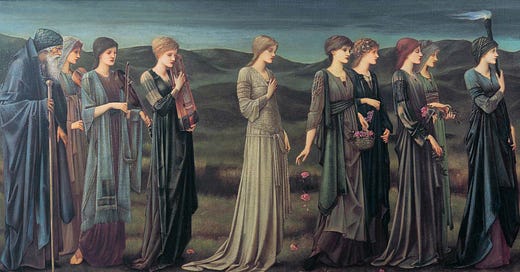The Johnson wedding: What price "lifelong" for Catholics now?
At least the groom has a get-out if there's a next time, writes George Pitcher
Of all the weddings at which I’ve presided as a priest – and it must be getting on for around 150 of them – I don’t remember a single one at which the couple has taken the ceremony as anything other than an entirely proper and sacramental event.
Yes, invariably there is laughter. I remember with fondness the bride who corpsed during her vows because her groom welled up. Or the time I took the rings from a best man on a beautiful little cushion, which the bride’s mother had made, with the ill-chosen words: “What a lovely little pouf.”
But the vows exchanged are addressed, as the introductory liturgy for Holy Matrimony requires, “reverently and responsibly in the sight of almighty God”. Especially the greatest line of all: “All that I am I give to you.”
Folk memory
That’s not to say these are deeply religious people in every instance. But the overwhelming majority of them enjoys at least what former Archbishop of Canterbury Rowan Williams has called a “folk memory” of what marriage means in the Christian tradition.
I have had just one couple who wanted to marry in church “because it was handy for the reception venue” - and our administrative staff dispensed with them quickly. In my privileged experience, we make sure no one enters church “lightly or selfishly” (that liturgy again).
All of which leads me to suppose that the Church of England now takes marriage rather more seriously than the Roman Catholic Church in its same jurisdiction, if the wedding of Mr and Mrs Boris Johnson at Westminster Cathedral last week is anything to go by.
I wish nothing other than nuptial bliss for Carrie and Boris Johnson. Nor do I presume that the presiding priest, Fr Daniel Humphreys, acted in anything but good faith, howsoever he would wish to define it. My point is only that the bar for remarrying divorced people now appears to be lower for Roman Catholics in this country than for Anglicans.
First, consider the Roman Catholic requirements. The idea that any rite of marriage other than its own is “invalid” for the Church of Rome – and therefore Mr Johnson was free to marry as if for his first time – is a new one on us.
One could make the case that the Anglican rite is an invalid order for Roman Catholics. But a priest in the Church of England, which is established in law, is also the registrar of the wedding – it follows that Westminster Cathedral would also have to hold that the British state’s secular marriage licence is invalid too, unless (in some curious way) it is blessed by the Catholic Church.
Highly contemptuous
This is not only very far from the experience of “ordinary” Roman Catholics, countless numbers of whom have been declined blessings in their Church after registry-office or Anglican ceremonies, or weddings after subsequent divorces, because Catholicism teaches that marriage is lifelong. It would also be highly contemptuous of our secular legislature, which stopped persecuting Roman Catholics through prohibitive treatments with the Roman Catholic Relief Act of 1829.
Anecdotally, rather than legislatively, I have Roman Catholics in our congregation in Sussex who, for a variety of ecclesiological reasons, would be entirely welcome at our altar rail, but who decline to make their communion with us because they are divorced. They don’t feel excused from their lifelong condition by “invalidity”.
Secondly, the provisions in canon law of the Church of England for marriage of divorced persons now seem way more stringent than for Roman Catholics, judging by the shutdown of Westminster Cathedral for that exclusive wedding last Saturday.
Among the many questions on which Church of England priests need to satisfy their bishops ahead of marrying divorced persons, by filling out an exhaustive form under instruction from General Synod (2002), are the following: “Would the effects of the proposed marriage… be such as to undermine the Church’s witness to marriage? Would the new marriage be likely to be a cause of hostile public comment or scandal?”
The answers to that are something the Church of England clearly considers important. So far as Westminster Cathedral is concerned… well, perish the thought.
Another question from General Synod: “Would permitting the new marriage be tantamount to consecrating an old infidelity?” And another: “Has either of the parties been divorced more than once?” In guidance on the latter, our canon law adds: “[T]he Church witnesses to lifelong marriage, and should not find itself being a party to ‘serial monogamy’, hence neither of the parties should normally have been married and divorced more than once” (CofE’s emphasis).
I have no doubt that these are the kinds of questions that Fr Humphreys addressed to the twice-divorced Boris Johnson and his bride in his wedding preparation of them. Anything less demanding would be inconsistent with the Roman Catholic catechism. It would also smack of the way that famous people are sometimes welcomed into the Catholic Church - as Ann Widdecombe was when the Church of England started ordaining women as priests - while ordinary people find its doors closed to them.
One final thought: I hope and pray that the Johnsons’ marriage will be as lifelong as the Church teaches it should be. But, heaven forfend, should Boris Johnson ever be pressed to the altar again, during his current wife’s lifetime, he now has an at least orthodox get-out. Because he’d surely only wish to be treated as any ordinary Roman Catholic would be.
George Pitcher is a visiting fellow at the LSE and an Anglican priest.




